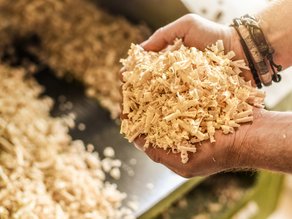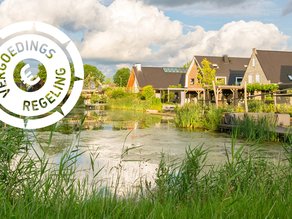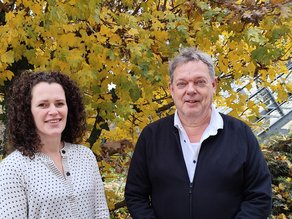Pro Suber biobased isolatie van geëxpandeerde kurk met CAT-1 data in NMD

For centuries, the special properties of cork have been used in many ways. Insulating buildings with cork is also by no means new. In fact, in monument construction, they already frequently work with the material during renovations to insulate. Yet the application of this 100% biobased material in construction is limited. Pro Suber has been working since 2014 to make cork - and specifically expanded cork - more widely known as an insulation material in Dutch construction. The vapor-opening and moisture-regulating material can also be found with category 1 data in the National Environmental Database. An interview with founder and owner of Pro Suber Arnoud Hanenburg.
Arnoud is in Portugal when we meet for this interview. Of the worldwide production of expanded cork, about 50% takes place there. The cork is extracted from forests of cork oaks. These trees grow mostly in countries around the Mediterranean Sea: besides Portugal, for example, in Spain, France (Corsica), Italy, Morocco, Algeria. Arnoud explains what is so special about the cork oak.
“Harvesting cork is done by peeling the cork bark off the tree. This is possible for the first time about 25 years after the tree was planted. So you don't have to cut down the tree for this. And the great thing is; when you peel off the cork bark, the tree starts working extra hard again to make a new cork bark. After about 9 to 11 years, you can then harvest cork again from the same tree.”

Pro Suber
Oprichter Arnoud Hanenburg
Niet alleen energie-nul, óók CO2-neutraal
Bijna 10 jaar geleden kwam Arnoud voor het eerst in aanraking met geëxpandeerde kurk. “Samen met twee kompanen had ik een architectenbureau en we waren op dat moment aanwezig op een beurs. Daar kwam ik een stand tegen met geëxpandeerde kurk, mét de claim dat het een 100% biobased materiaal is.”
“Wij waren net met een project bezig om energie-nul-woningen te realiseren en het triggerde mij enorm. Energie-nul is natuurlijk mooi, maar dat heeft nog weinig te maken met de complete milieu-impact van een woning of gebouw. In het ontwerp zaten toen bijvoorbeeld nog grote pakketten PIR en PUR isolatie. Dat is voor mij het startpunt geweest van Pro Suber. Ik wilde niet alleen energie-nul, ik wilde ook CO2-neutraal.”

100% biobased
Arnoud traveled to Portugal shortly after that fair to visit one of the largest cork factories in the world. “I wanted to see where the material comes from and how it is made. There I got confirmation that the material really is as beautiful as it seems. No tree needs to be cut down for cork and it has an awful lot of good properties.”
“I saw at the factory how cork expansion works. By steam baking chunks of cork - leftover material from other applications - it pops like popcorn. During that expansion, the resins in the cork liquefy and bind the material. This results in large blocks of baked cork from which you can make plates. WITHOUT the need for glue.”
“This process of cork expansion creates a 100% biobased material that you can use as thermal insulation, for acoustic improvement, as a decorative accent wall and cork facade, and as a solution for reducing heat stress in buildings, among other things. The expanded cork insulation is vapor-permeable and moisture-regulating.”
If you go for something, then all the way
After consulting with his business partners, Arnoud left the architectural firm and decided to focus entirely on making the use of expanded cork in construction more widely known in the Netherlands.
That beginning certainly wasn't easy. There was no trade fair or event Arnoud wasn't attending at the time, but recent Dutch reference projects were still lacking. The beginning therefore meant literally getting the first pack of expanded cork sold. “I knew that when I started. I knew it wouldn't be easy. But I also believe: if you go for something, you have to go all the way.”
First good reference
Gradually, the network of suppliers of biobased materials became larger and closer, which led, among other things, to a first house with a cork façade finish being shown in Amsterdam at the Innovation Expo in 2016.
“That was an important moment for me. From that moment on, there was a reference. An example of how expanded cork behaves in a home, in our climate. Because there were plenty of examples in other countries, but people still experience that differently than in a home in the Netherlands. It helps if they can walk past it again three years later. To see if it still looks so nice and works so well.”
There are now many more projects in the Netherlands where expanded cork has been used. In monument construction, where it had been known for some time, but also in new construction. And Pro Suber has resellers in the market these days.

Volume of applications impossible to keep up with
Arnoud notices that interest in biobased materials has grown considerably in recent years. With that, interest in expanded cork also grew.
“The amount of requests for information is almost impossible to keep up with, so that's good news. What we are now also focusing on is applying expanded cork in combination with other biobased materials. Because I need to convince people less and less that expanded cork is a material with many good properties. But for now, the cost of the material is considerably higher than traditional insulation materials.”
“That is why we are looking at how we can make the application more economically attractive. When applying wood fiber, for example, it is currently prescribed that the top plate must be a PIR plate because of condensation. But that can easily be replaced by expanded cork. Then you get a much higher percentage of biobased, and condensation may very well occur in cork. The material then just stays in the same condition and maintains the same performance.”
Continue to innovate
Pro Suber is also constantly looking for new applications. “For example, using expanded cork for the casing of wtw installations, for noise reduction. Or in combination with greenery. In green roofs, for example, instead of the plastic mats under the substrate. Green facades with expanded cork are also already available. And in Alphen aan den Rijn we supplied expanded cork for ten large floats floating in the water with greenery on top. So much can be done with this product.”
Category 1 data in NMD
Since October 2023, Pro Suber's expanded cork can also be found with category 1 data in the National Environmental Database.
“For further publicizing the good properties of this product, this is a logical step. I picked it up together with other suppliers of biobased materials. In a collective. In doing so, we had a life cycle analysis made for the category 1 data and at the same time a research project of the WUR is running, on how to add a CO2 valuation to products. That is a two-year project whose results will be known soon (early 2024). I think that such a CO2 valuation will be of great added value to be able to compare the environmental impact of products even better.”
This page was translated using DeepL.



